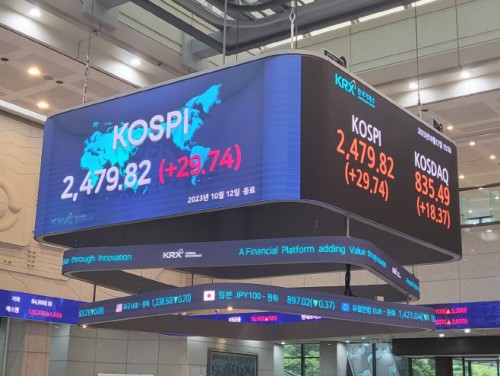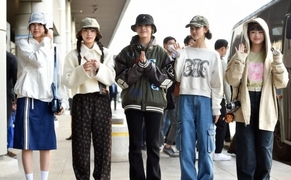 |
| An electronic signboard at Korea Exchange in Seoul / Photographed by Son Kang-hoon |
AsiaToday reporter Son Kang-hoon
Korean stocks soared after the country reimposed a complete ban on short-selling. The KOSPI rose above the 2,500 mark for the first time in 42 days, and a sidecar trading curb was activated at one point on the KOSDAQ for the first time in three years and five months. Market observers say that the buying spree was partly due to short covering, and that stocks with a large balance of short selling led the stock market to rebound.
According to the Korea Exchange on Monday, the KOSPI closed at 2,502.37 points, up 5.66 percent or 134.03 points from the previous session. The benchmark index remained in the 2,400-level due to unfavorable high-interest rates, but it immediately rose above the 2,500 mark. KOSDAQ closed at 839.45, up 7.34 percent or 57.4 points from the previous session. Due to the rise, a sidecar trading curb was activated for the first time in three years and five months since June 16, 2020.
The buying spree reflected short covering. Analysts say that the ban on short-selling of all domestic stock markets by June 2024 has forced existing short sellers to buy back borrowed stocks to prevent losses, leading to the rise.
In fact, stocks with a high proportion of short selling balances saw significant gains. Hotel Shilla, Lotte Tour, and Foosung, which are the top KOSPI short sellers, went up 5.85 percent, 7.21 percent, and 7.97 percent, respectively. Top stocks in KOSDAQ, including HLB, Humasis, and LNF also showed double-digit growth with 14.38 percent, 12.80 percent, and 25.30 percent, respectively.
Analysts believe that the ban on short selling will lead to the rise of the stock market for the time being. Currently, the KOSPI short selling balance is 11.4 trillion won, up 2 trillion won from the 9.4 trillion won balance at the beginning of the year, and the KOSPI’s borrowed short selling balance fell to the level of the beginning of the year when short covering occurred in May.
“The Korean stock market is believed to have reached a stable phase due to the effect of the short selling ban, with the KOSDAQ rising sharply backed by the secondary battery industry,” NH Investment Securities analyst Na Jeong-hwan said. “The Korean stock market will reach a stable phase due to the stabilization of short covering volume and global external variables following the short selling ban.”
#KOSPI #KOSDAQ #short selling ban
Copyright by Asiatoday
Most Read
-
1
-
2
-
3
-
4
-
5
-
6
-
7





















